1.27
In 925 BC, the end of
Ancient Times, Greece was 18 empire cycles away from learning the advanced government, The Republic. Alexander was planning to assault the forces of China in the next few years, because the rich terrain, iron and luxuries of China would be needed if Greece was to grow strong in the coming centuries. In addition, he had received word that the Chinese would soon have a new type of defender, the Pikeman. This defender would spell utter doom for the archers and soon-to-be horsemen of the Greek Empire, so China had to be weakened before that was allowed to happen. Currently, Chinas large empire was defended almost entirely by untrained spearmen.
The Middle Ages, 925 BC 490 AD
War with China: 800 BC 30 BC
In 800 BC, Alexander declared war on the Chinese, and shortly thereafter eight archers made the dye city of Shanghai part of the Greek empire. Alexander was not present for the attack, as he was busy with foreign dignitaries: Monotheism was traded to the Koreans for the secrets of Feudalism, and India and Rome were given Monotheism to join in the Chinese conflict.
Special Ops
A secret mission was given to an elite Hoplite division at the onset of the war. It was an apprehensive operation, not because of the dangers involved, but because the Hoplites were the pride of the Greek people, and Alexander knew that a military victory would change the very fabric of his empire. That celebration could not be allowed to happen until a new government was in place. Nevertheless, Alexander felt a crippling blow must be dealt to the military capability of the Chinese economy, and the Hoplites were the only units capable of accomplishing the objective. The secret mission was successful, and the iron mine of Tsingtao was pillaged before the Chinese military could respond. The fate of the entire Chinese Empire was thus sealed.
The Golden Age of the Greek Republic and the End of Chinese Autonomy
In 570 BC, the year Chinas capitol city of Beijing was annexed by Greek horsemen and archers, Greek scientists discovered the Republic. Alexander immediately delivered an inspired speech to the Greek people touting the freedoms of this new government. Unfortunately, the Greeks (being a masochistic lot) preferred the whip to this newfangled concept of freedom, and they began a revolt that lasted for 100 years. At the end of this pathetic century, Alexander again called on the elite Hoplite division holed up in the mountains near Tsingtao. The unit had been joined by several divisions of horsemen, and all were ordered to attack the city. The Hoplites flawlessly destroyed the last defending archers, and the Greek people began a celebration that would last from 450BC to 30BC. Coincidentally, this year also marked the annexation of the last Chinese city, ending 770 years of conflict. Due in part to the celebration and in part to the abundance of furs, spices and dyes throughout the empire (and near the end, ivory), the people were very happy throughout the conflict. Alexanders only disappointment during this time was in his lack of military leaders. Although he had many elite divisions, none seemed to contain a man with the heart to lead.
War-time Research
The Chinese conflict marked a period of scientific stagnation throughout the world. The only peaceful nations were the Ottoman and Egyptian Empires, and as a result, the only technologies discovered included Engineering, Chivalry, Theology and the Printing Press, the latter two researched by Greek scientists. Education was acquired by the Indians in 10 BC, but Alexander would not attempt to acquire it until Invention was learned 4 turns later. Although tech brokerage had earned the Greek empire around 73gpt and many lump-sum payments over the years, Alexander felt the rate of world research was inexcusable. He needed a new plan.
A New Plan for a Changing Era
Alexander was of two minds as the change-of-era approached. On one hand, he dreamed of the world electing him supreme leaderand sooner would be preferable to later. On the other, he wanted to conquer at least two-thirds of the known world. Given the war-crippled tech pace of the last few centuries, the former seemed less likely than ever, but his friends said, all you ever do is dominate, why dont you do something else for a change? So he decided for the peaceful route. Well, mostly peaceful: he couldnt really feel good about himself if he did not rule at least half the world. So his goal became a peaceful victory, but also to control all non-Korean lands east of Rome.
There were three major problems to overcome: increasing the speed of territory acquisition, speeding up world research, and speeding up Greek research. Unfortunately, all three problems were somewhat tied together. No nation could be conquered more quickly than India, because of their proximity to Greece and because of their weak military. However, if Greece was to maximize its research, then another nation would have to fund her military upgrades from horsemen to knights, and later horsemen to cavalry. There was only one nation in the world that could generate a tremendous amount of gold each year, and that too was India. For these reasons, Alexander eliminated Ghandi as a near-term military target, and, although he was unsure of the long-term merits of his decision, he set his sights upon the far-off Roman Empire.
The city of Rome was mesmerizing to Alexander: all land trade had to pass through that city: it was indeed the bottleneck of the entire world. It held the Pyramids, and given that it was by far the first to start Sun Tzus, it would likely soon hold that wonder as well. Those were the positives. The negatives were that the Romans had the worlds largest military, and that Rome itself, being built atop a steep hill and accessible to land from only two directions, was the most defensible city in the known world. It was a fascinating target, and Alexander could not resist.
The military portion of his plan would therefore involve marching peacefully through Indias land to sack eastern Roman cities and then Rome itself. Hopefully, the benefits of the Pyramids would offset the benefits that would have been gained by the early conquest of Indian lands, although he was unsure of that.
The second half of the plan, speeding Greek and World scientific research, was a bit more complex. Greek cities now stretched out in a long, narrow band to the north of the continent, and corruption was crippling the empire. The Forbidden palace had been built in 50 BC just north of Athens in Thermopylae, but that yielded only a marginal improvement. The palace needed to move to the Western lands, but Greek advisors warned that it would take millennia to build a new palace near the center of the new holdings.
Fortunately, one of Alexanders trusted advisors presented him with an arcane tome entitled Free Palace Jump, written by the great philosopher DaveMcW. It stated that, given the correct conditions, all Alexander had to do was say I do not want Athens anymore, and his palace would instantly be transported through time and space to the location of his choosing. Fascinating stuff, really, although the city of Athens would be destroyed in the process. Near the end of the Chinese War, Alex proceeded to command citizens of his largest cities to relocate to the Chinese city of Chengdu, and in 10 AD, he ordered his financial advisor to give him a financial report:
Income from cities: 330
From other civs: 73
Income: 403
Expenses: 374
Net Gain: 29 gpt
Science at 80% (189 beakers)
Corruption: 102
Invention due in 2 turns.
Alex then said the magic word Abandon, and he and his palace took a magic journey to the city of Chengdu. New Athens was immediately founded on the ruins of the old capitol, and the financial advisor reported the following changes in the empire:
Income from cities: 337 (+7)
From other civs: 73 (same)
Income: 410 (+7)
Expenses: 353 (-21, I am not sure why this dropped so much)
Net Gain: 57 gpt (+28)
Science at 80% (227 beakers) (+38)
Corruption: 63 (-39)
Invention due in 2 turns.
The economic improvement was not dramatic, but Alex knew this would quickly change as the formerly Chinese cities grew in size.
Foreign Relations, Infrastructure Development, Roman War Preparations: 10 AD 260 AD
Although the war with China had added much territory to the Greek empire, it had taken many centuries to reach Chinas more remote cities, and the infrastructure of Greece had suffered. Therefore, Alexanders first order of business was to build infrastructure. Most Chinese cities were commended to produce workers and libraries. Native Greek cities were given orders according to need: some built marketplaces or aqueducts, others harbors or courthouses. The builds would take time though, and research was moving too slowly: around seven empire cycles on average, and Alexanders goal was to reduce that to four. The problem was that he could not devote the entire commerce of the nation to research, he was forced to use some taxes in order to pay for the upkeep of the empire.
In 70 AD, thanks to the research of Invention, Alexander was able to reduce research time to six empire cycles, by bringing in about 60gpt from India and another 50 from other nations, as well as the knowledge of Education. However, in 130 AD, the Greek treasury was emptied due to the costs of advanced training for a force of 10 horsemen: the special units would now be known as knights. In 210 AD, this force was dispatched toward Rome. Alexander also traded the knowledge of Gunpowder for about 600g, 111gpt and the secrets of Astronomy and Banking. This additional income was not only used for military upgrades, but for rushing universities in select cities of the empire.
The Siege of Rome, End of the Middle Ages: 270 AD 490 AD
In 270 AD, while Greeces force of ten knights was still safe in Indian lands, Alexander declared war on Rome. The Ottoman and Arab empires joined the conflict in exchange for the knowledge of Astronomy. Alexander then waited two empire cycles before moving his troops onto Roman soil, in hopes that Caesar would send his legions to respond to the threat of Ottoman and Arab aggression. Three divisions of Roman pikemen were destroyed in the capture of Pompeii, along with one division of Greek knights. Immediately afterward, two pike divisions were destroyed and Pisae was captured, again at a cost of one knight. Alexander then traded the knowledge of Chemistry to the rest of the world for the knowledge of Music Theory, 300g and 115gpt. He was also thrilled to learn that the Roman city of Cumae completed Leonardos Workshop.
In 310 AD an additional force of 14 horsemen were trained up to knights and immediately sent to support the war, as many Legions and Medieval Infantry had begun to pour out of Rome. The initial assault on Rome had stalled, due to the sighting of a vast force of Roman Legions inside Rome: an Army of them in fact. Fortunately, after the Greek forces withdrew to the safety of captured cities, the Roman Army went to fight elsewhere, because it was never seen again.Greek scientists at this time finally reached Alexanders goal of four empire cycles per discovery, due in part to many more gpt deals that Alexander made with other nations. In 380 AD, a Greek strategist revealed the secrets of Cavalry, and Leonardos workshop was taken a few years later. In 460 AD, Rome itself was finally under Greek rule. Alexander was not happy, however. Taking the wonders of Sun Tzu and the Pyramids had taken too long.
In 470 AD, Alexander was terribly surprised: one of his cities, Rome, revolted and refused to produce goods for the empire. Having ruled for nearly 4500 years, it was his first experience with this phenomenon, but it was easily handled. He ordered that the militant Romans be starved from existence.
Greek scientists finished researching Magnetism in 490 AD. They announced that they had also unlocked the secrets of Medicine, and entered a distinctly new age of development. Alexander was feeling magnanimous, so he gave the knowledge of Magnetism to the Koreans. He was displeased to learn that magnets must have healing properties, because this catapulted the Koreans to the mastery of Medicine as well. This put him in a very foul mood, so he went to his War Room. That always made him feel better. There he looked at a map of the current world:
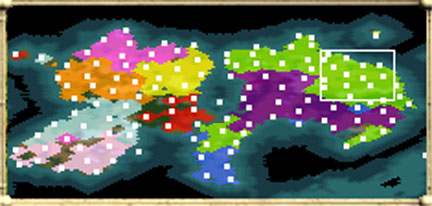
In a few short years, Rome would be eliminated from the mainland continent. India would not be far behind now that Greece could add six cavalry on every empire cycle to its army of 35, while still devoting most of the economy to infrastructure. But Alexander was not happy: he could feel his goal of being nominated as World Ruler slipping further and further into the future. The problem was research. Although Alex was confident that Greek scientists would present him with new technology nearly every 40 years, the research of the other nations of the world had come to a standstill. Unless the other nations could be persuaded to research, he estimated it would be 600 years--just into the next millennium--before he could convince them to elect him as World Leader.

 I had iron connected for a few hundred years but that colony was eventually culturally taken by the Koreans. I never had a chance at the horses and the saltpeter was annoyingly spread 1 to a civ. By the time I had a decent force of Medieval Infantry China and India were huge and sporting nice shiny UU's just waiting to roll over my puny little nation. The terrain and blistering tech pace were the big obstacles in not hitting those two before Chivalry. It took forever setting my cities up and getting them ready for a military buildup.
I had iron connected for a few hundred years but that colony was eventually culturally taken by the Koreans. I never had a chance at the horses and the saltpeter was annoyingly spread 1 to a civ. By the time I had a decent force of Medieval Infantry China and India were huge and sporting nice shiny UU's just waiting to roll over my puny little nation. The terrain and blistering tech pace were the big obstacles in not hitting those two before Chivalry. It took forever setting my cities up and getting them ready for a military buildup.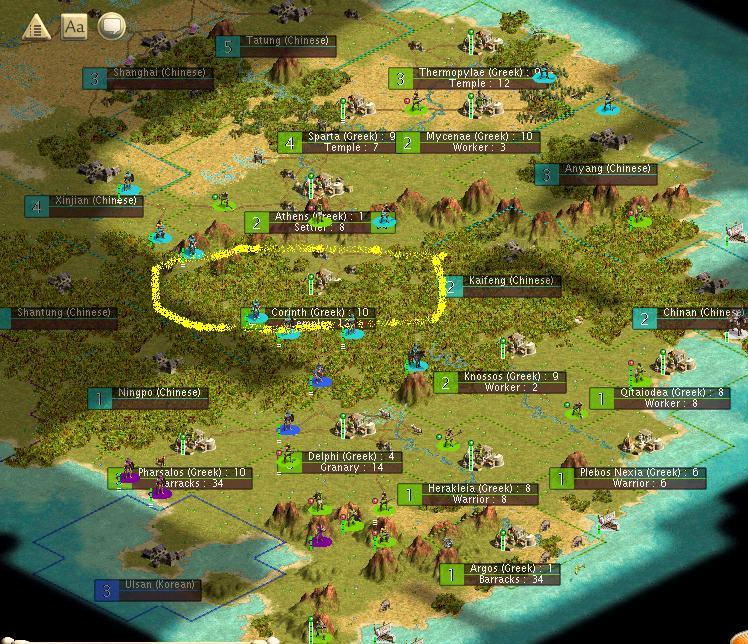
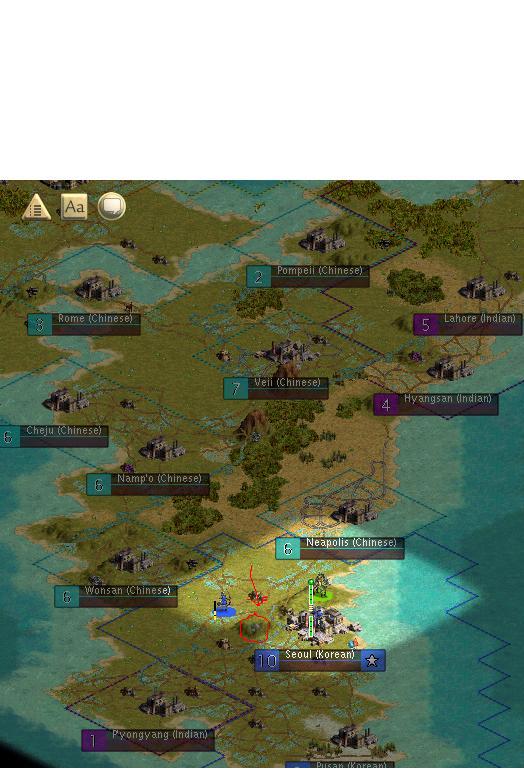
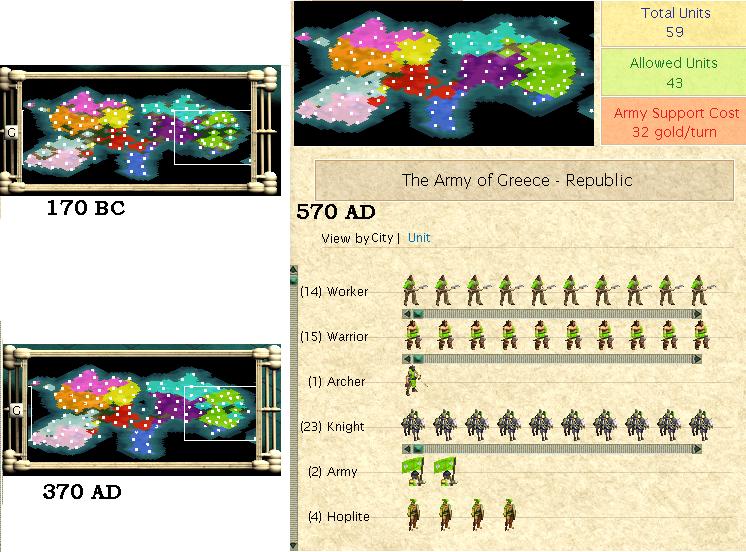


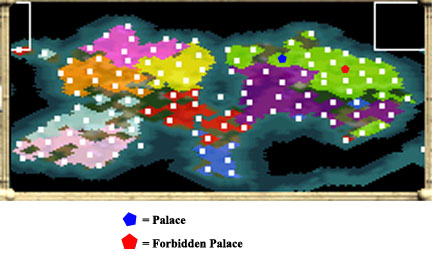

 In my game Arabia built the Great Library; if this had happened in your game, how would you catch up in Technology?
In my game Arabia built the Great Library; if this had happened in your game, how would you catch up in Technology?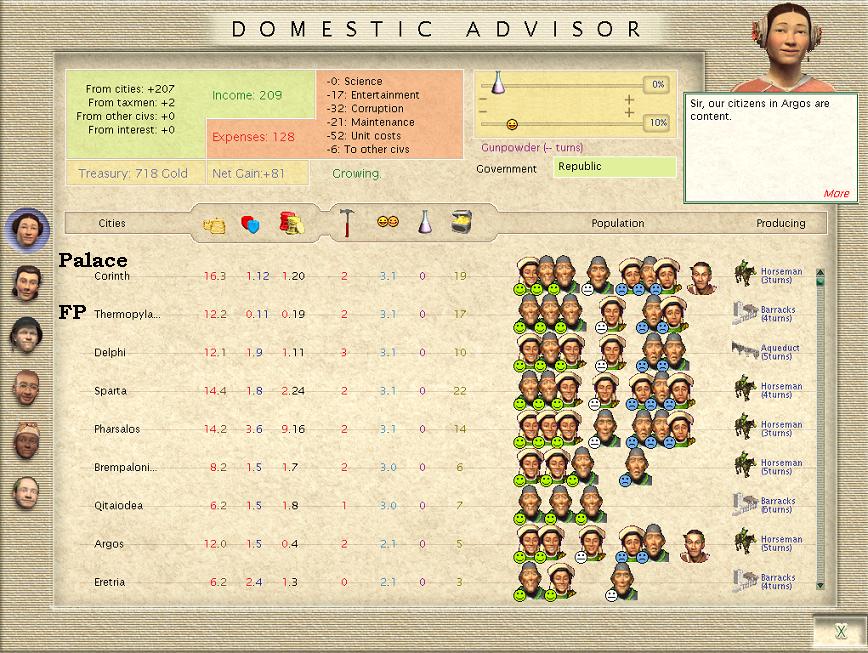
![PTW Icon [ptw] [ptw]](/images/smilies/ptw.gif) 1.27f
1.27f
 (Well, I am still in Despotism, 'enjoying' 34% corruption. Half my cities are far away from my capital and FP. I have 18 cities.)
(Well, I am still in Despotism, 'enjoying' 34% corruption. Half my cities are far away from my capital and FP. I have 18 cities.)